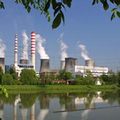 根據聯合國氣候變化綱要公約(UNFCCC)秘書處的資料顯示,40個工業化國家的溫室氣體總排放量持續上升,並於2005年達到歷史高峰。最高的成長率則來自運輸部的排放量。這份新的資料正好在即將於印尼巴里島舉行的聯合國氣候變遷會議的前夕發表。
根據聯合國氣候變化綱要公約(UNFCCC)秘書處的資料顯示,40個工業化國家的溫室氣體總排放量持續上升,並於2005年達到歷史高峰。最高的成長率則來自運輸部的排放量。這份新的資料正好在即將於印尼巴里島舉行的聯合國氣候變遷會議的前夕發表。
溫室氣體排放量的成長主要來自高度工業化國家經濟的持續成長,以及前東歐集團國家經濟復甦所致。若將簽署與批准京都議定書的國家合併計算,在各國實施各項政策與措施後,第一階段(2008-2012年)預估可以達到11%的溫室氣體減量。
然而秘書處表示,僅管歐盟透過京都議定書的機制,如排放交易等,已經可以達成其減量目標,但其他各國的排放量卻呈現上升的趨勢。
UNFCCC的執行秘書德布爾(Yvo de Boer)說:「假如有更多的政策推出並加以執行,則簽署京都議定書的全體國家,共同達成15%的減量目標是可行的。」他進一步表示:「但我們也不能再掩飾過去幾年來,部份國家的溫室氣體排放量持續成長的事實,而且,他們必須採取行動以限制其排放量。」
聯合國秘書長潘基文表示:「我們絕對有能力把這些非做不可的事做到盡善盡美。我們可以用新的或改良過的方法去製造、消費與丟棄。我們可以推廣對環境更友善的產業,在減少溫室氣體排放的同時,刺激發展並創造就業機會。我們可以開創一個全球合作的新世代,在對氣候友善的發展浪潮上,大家共同協手合作。」
為使上述的理想實現,潘基文認為,世界上的工業化國家必須要與那些最容易受到氣候變遷衝擊的發展中國家,進行全面性的協商。
IPCC的主席帕喬里(Rajendra Pachauri)表示,政府有「各式各樣的政策與工具」可以用來創造誘因去減輕排放行為,尤其是二氧化碳的排放。帕喬里說:「我們需要一個全新的道德觀,讓每個人都了解我們面臨的挑戰及其重要性,並且開始採取行動去改變生活方式與態度。」
The total greenhouse gas emissions of 40 industrialized nations rose to an all-time high in 2005, continuing the upward trend of the year before, according to data submitted to the secretariat of the United Nations Framework Convention on Climate Change. Emissions from the transport sector grew at the highest rate. The new data comes just ahead of a major UN climate conference in Bali, Indonesia.
The increases came from the continued economic growth in highly industrialized countries as well as the revived economic growth in former European East bloc nations.
Taken together, the countries that signed and ratified the Kyoto Protocol are projected to achieve reductions on the order of 11 percent for the first Kyoto commitment period, from 2008 to 2012, provided policies and measures adopted by these countries deliver the reductions as projected.
But while the European Union as a whole is projected to achieve its objective making use of the Kyoto mechanisms such as emissions trading, other Kyoto Parties are projected to see an upward trend in emissions, the secretariat said.
"For the totality of Kyoto signatory countries, reductions of 15 percent are feasible should additional policies be planned and implemented," said Yvo de Boer, executive secretary of the UNFCCC. "But we should not hide the fact that there is continuing greenhouse gas emissions growth on the part of several countries and that they must do more to rein in their emissions."
"We can transform a necessity into virtue," said the secretary-general Ban Ki-moon. "We can pursue new and improved ways to produce, consume and discard. We can promote environmentally friendly industries that spur development and job creation even as they reduce emissions. We can usher in a new era of global partnership, one that helps lift all boats on the rising tide of climate-friendly development."
For this to happen, Ban said the world's industrialized countries must form a "grand bargain" with developing nations, which are the most vulnerable to the impact of climate change.
IPCC Chairman Rajendra Pachauri said governments have "a wide variety of policies and instruments" available to create incentives to mitigate behavior – especially in the area of carbon emissions. "We need a new ethic by which every human being realizes the importance of the challenge we are facing and starts to take action through changes in lifestyle and attitude," Pachauri said.
全文及圖片詳見 ENS



